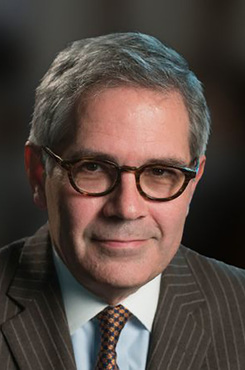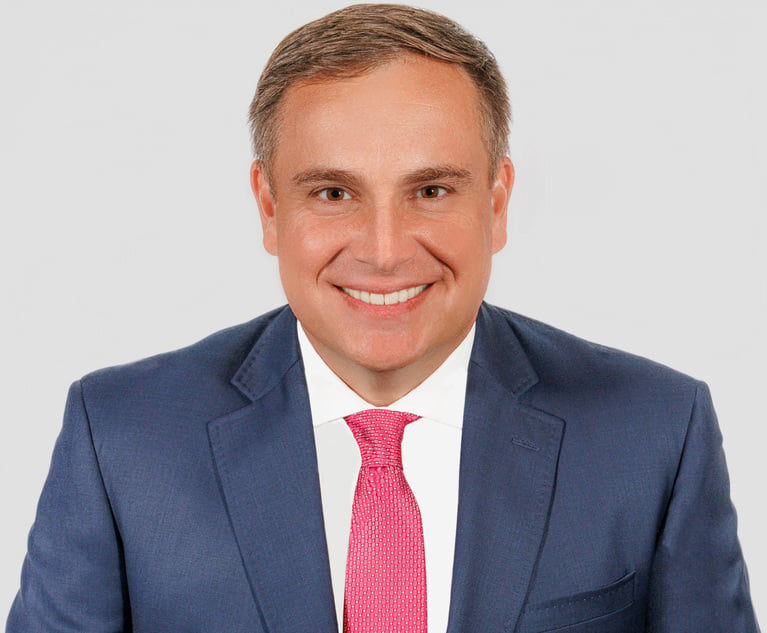Krasner Transition Quiet but Watchers Discern Signs of Progress
District Attorney-elect Larry Krasner has been very quiet about his transition so far, but, according to numerous sources familiar with the workings of the Philadelphia District Attorney's Office, there are signs that efforts are proceeding apace.
November 20, 2017 at 03:12 PM
5 minute read
 Larry Krasner.
Larry Krasner. District Attorney-elect Larry Krasner has been very quiet about his transition so far, but, according to numerous sources familiar with the workings of the Philadelphia District Attorney's Office, there are signs that efforts are proceeding apace.
Krasner was voted into office by a 3-1 margin earlier this month promising to pursue an ambitious criminal justice reform agenda. That platform has left many in the office and police force nervous, and others wondering how he can accomplish those goals while still fulfilling the traditional role of being an advocate for victims.
Krasner has remained silent on any details about what his administrative changes might look like, or who he might bring in to help lead the office, but he recently sent an open letter to prosecutors, telling them not to be frightened about his transition, and, according to sources, he has also been in contact with some members of the office.
Ben Waxman, a spokesman for Krasner, did not give specifics about Krasner's transition, but noted that the district attorney-elect will be officially taking over the role in about six weeks.
“There's a lot of work to do, and we're making sure we're going about it in a deliberative and thoughtful way,” he said. “I would just say, stay tuned. Larry will take office in early January, and a lot needs to get done.”
A spokesman for the District Attorney's Office declined to comment about any transition efforts.
During his campaign, Krasner often said he has strong ties within the prosecutors' office and has a great rapport with many police officers, some of whom, he said, have contacted him in the past about potential civil rights issues. However, according to many attorneys, Krasner faces a trickier transition than his predecessors. Along with his promises of bringing sweeping changes to the office, Krasner has not previously worked as a prosecutor, but instead worked as a criminal defense and civil rights attorney, litigating against the police and prosecutors he is now set to work closely with.
Attorneys who spoke with The Legal had mixed answers about what actions Kranser should take to ensure a smooth and successful transition, but most said they are expected to see some turnover when he takes office, although all agreed that is expected during any change of administration.
Former District Attorney and Chief Justice of Pennsylvania Ronald Castille, who led the office from 1985 until 1991, said he fired 19 assistant district attorneys when he took over the office from Ed Rendell.
Rendell had asked everyone to submit their resignations and then re-apply for their jobs, and before that it wasn't uncommon to have all members of the opposite political party resign from the office during an administrative change, Castille said.
On the other hand, former District Attorney Lynne Abraham, who headed the office from 1991 until 2010, said she only asked two people to leave after she took over the office, and even kept Castille's first assistant, Bill Chadwick, in that top role.
Several defense attorneys said they have high hopes for Krasner's ability to mount a smooth transition, including William J. Brennan, who said the letter Krasner sent to the office was “brilliant.”
“You do the job you're hired to do, and right now the citizens hired him to be the prosecutor. He's not going to allow violent crime to go unpunished,” Brennan said. “You have to remember how smart the guy is. He knows what the job is, and he will act accordingly.”
A. Charles Peruto Jr. agreed, and said he does not think Krasner will be easily distracted when it comes to taking over the office.
“If you know Larry, you know he's not concerned about the talk about people's nerves, or people's perceptions about getting it smooth. He just cares about getting it right,” Peruto said.
Former district attorneys Castille and Abraham, however, both said Krasner likely faces a challenging transition.
According to Castille, the most significant decisions Krasner will make boil down to who he selects as his first assistant, and who he selects as his chief of county detectives.
“That's going to be critical because of the number of crimes, and the situation with drugs, and just the innumerable things he has never been part of that are going to leap up into his lap very shortly,” Castille said.
Castille said his transition was very smooth since, after working his way up through the ranks of the office over many years, he already knew all the key players in the office. Being an outsider, Krasner will need to spend a good deal of time reviewing the office leadership to determine who the political hires might be, and who the productive members of the office are, Castille said.
According to Castille, there are certain things Krasner might want to immediately start doing, such as reaching out to the Fraternal Order of Police to mend their strained relationship, or making efforts to understand the ins and outs of the office.
Abraham, however, was critical of Krasner's platform and his reported transition efforts.
Sending the letter to the office was the wrong tactic, she said, and only made people uneasy.
“He ought to be keeping it close to the vest. He doesn't know anything about the office,” she said.
Abraham said that for the first six months she did nothing except “learn, learn, learn, learn, learn.”
“Who did what, who didn't do what. All the nuts and bolts,” she said. Making any announcements or decisions before getting a good understanding of the office, she said, “would betray your ignorance.”
This content has been archived. It is available through our partners, LexisNexis® and Bloomberg Law.
To view this content, please continue to their sites.
Not a Lexis Subscriber?
Subscribe Now
Not a Bloomberg Law Subscriber?
Subscribe Now
NOT FOR REPRINT
© 2025 ALM Global, LLC, All Rights Reserved. Request academic re-use from www.copyright.com. All other uses, submit a request to [email protected]. For more information visit Asset & Logo Licensing.
You Might Like
View All
Pa. Defense Firm Sued by Client Over Ex-Eagles Player's $43.5M Med Mal Win
3 minute read


Trending Stories
Who Got The Work
J. Brugh Lower of Gibbons has entered an appearance for industrial equipment supplier Devco Corporation in a pending trademark infringement lawsuit. The suit, accusing the defendant of selling knock-off Graco products, was filed Dec. 18 in New Jersey District Court by Rivkin Radler on behalf of Graco Inc. and Graco Minnesota. The case, assigned to U.S. District Judge Zahid N. Quraishi, is 3:24-cv-11294, Graco Inc. et al v. Devco Corporation.
Who Got The Work
Rebecca Maller-Stein and Kent A. Yalowitz of Arnold & Porter Kaye Scholer have entered their appearances for Hanaco Venture Capital and its executives, Lior Prosor and David Frankel, in a pending securities lawsuit. The action, filed on Dec. 24 in New York Southern District Court by Zell, Aron & Co. on behalf of Goldeneye Advisors, accuses the defendants of negligently and fraudulently managing the plaintiff's $1 million investment. The case, assigned to U.S. District Judge Vernon S. Broderick, is 1:24-cv-09918, Goldeneye Advisors, LLC v. Hanaco Venture Capital, Ltd. et al.
Who Got The Work
Attorneys from A&O Shearman has stepped in as defense counsel for Toronto-Dominion Bank and other defendants in a pending securities class action. The suit, filed Dec. 11 in New York Southern District Court by Bleichmar Fonti & Auld, accuses the defendants of concealing the bank's 'pervasive' deficiencies in regards to its compliance with the Bank Secrecy Act and the quality of its anti-money laundering controls. The case, assigned to U.S. District Judge Arun Subramanian, is 1:24-cv-09445, Gonzalez v. The Toronto-Dominion Bank et al.
Who Got The Work
Crown Castle International, a Pennsylvania company providing shared communications infrastructure, has turned to Luke D. Wolf of Gordon Rees Scully Mansukhani to fend off a pending breach-of-contract lawsuit. The court action, filed Nov. 25 in Michigan Eastern District Court by Hooper Hathaway PC on behalf of The Town Residences LLC, accuses Crown Castle of failing to transfer approximately $30,000 in utility payments from T-Mobile in breach of a roof-top lease and assignment agreement. The case, assigned to U.S. District Judge Susan K. Declercq, is 2:24-cv-13131, The Town Residences LLC v. T-Mobile US, Inc. et al.
Who Got The Work
Wilfred P. Coronato and Daniel M. Schwartz of McCarter & English have stepped in as defense counsel to Electrolux Home Products Inc. in a pending product liability lawsuit. The court action, filed Nov. 26 in New York Eastern District Court by Poulos Lopiccolo PC and Nagel Rice LLP on behalf of David Stern, alleges that the defendant's refrigerators’ drawers and shelving repeatedly break and fall apart within months after purchase. The case, assigned to U.S. District Judge Joan M. Azrack, is 2:24-cv-08204, Stern v. Electrolux Home Products, Inc.
Featured Firms
Law Offices of Gary Martin Hays & Associates, P.C.
(470) 294-1674
Law Offices of Mark E. Salomone
(857) 444-6468
Smith & Hassler
(713) 739-1250





